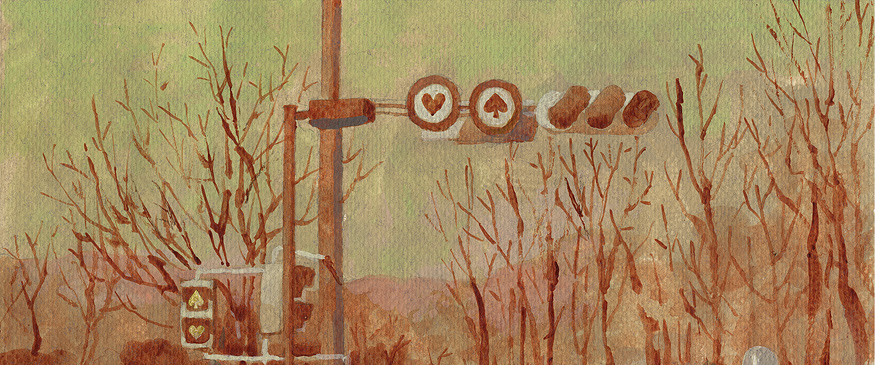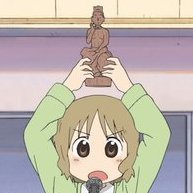-
Content count
187 -
Joined
-
Last visited
-
Days Won
1
Posts posted by whocoulditbe?
-
-
2 minutes ago, Shadow_self said:Curiously, to move on from this...is that an unpopular opinion???
That one should hold themselves to the same standard they hold others?
It's very hard to do that, since the experience of being a person is so different from watching one from the outside. Inevitably we are harsher to ourselves than to others on some points, and more forgiving about other things. But I have faith that my acquaintances will be brave enough to point out serious flaws that I miss about myself, and in return I will do the same for them. There does not need to be any bitterness about it either way.
-
 2
2
-
-
Interesting that this emptiness 虛 xu is not the same 空 kong that translates sunyata in Buddhist texts. Are there different connotations?
-
What does the title mean, three-grass treatise?
-
-
1 minute ago, Nungali said:?
Allow me ;
" I've been ' vegetarian ' for several years now and find the idea of eating land meat gross, but I still crave fish and seafood."
What about land crabs ?
I don't eat fish, I just crave them, unless you think the desire itself invalidates the abstinence? Never really liked crabs.
-
To preface this thread: NFTs are mostely lame, and people who go on about how lame they are are all lame.
-
Personally, I believe in prescience. (Read: People who disagree with me won't for long!)
-
 1
1
-
 1
1
-
-
Messing with rich text isn't cool. -
6 minutes ago, steve said:Unpopular opinion #37:
Nearly everything everyone says here is an expression of their own personal condition and experience and has relatively little to do with the outside world.
This is predictable. In the Chinese context, Confucianism has generally focussed more on the external, and Daoism on the internal. If we wanted to talk empirically about the world economy, ecology, etc., we could do that here. But yeah, there might be better places on the interwebs for that kind of discussion.
-
 7 minutes ago, oak said:
7 minutes ago, oak said:I go fully vegan sometimes but confess that I like plants way more than I like animals.
I've been vegetarian for several years now and find the idea of eating land meat gross, but I still crave fish and seafood.
-
 1
1
-
-
At some point I need to read the commentary by Guo Xiang (the guy who redacted the current version of the Zhuangzi). There's a translation by Richard John Lynn.
-
Opinion:
People who strive day and night for some kind of breakthrough, spiritual or otherwise, put twice as much effort into avoiding and ignoring the confrontation that would be needed to bring it about. Or worse, the effort to find it might itself be a disguised form of the avoidance. And this disguise can be doubled over itself countless times, so that we repeatedly find that the feeling of getting past it only entangles us further.
-
 3
3
-
 1
1
-
-
14 hours ago, Kojiro said:Honestly, for me this moral law as understood by Sun Tzu is a slave belief system in which they are blindly following their ruler, that is what it is in my opinion
If you can accept Nietzsche's thing about slave morality being based around resentiment and reaction, then this is just what Sunzi is advocating to avoid. The law that can be followed blindly is the gentlest kind of law, since it seems to come not from the ruler, but from within. When one is acting as a true slave, one's senses are at their most exercised, far from being blind, since the senses are the means by which control and fear are imposed on the mind. But it is better to understand the nature of those under your command, subtly steering them towards your intentions (and your intentions towards their capacities) rather than crudely imposing them like a mould. That way, you let their useful qualities neither decay nor become exhausted. This kind of power can be so subtle that it feels just like nature, like Zhuangzi's well-fitting shoe, but that makes it no less powerful, nor does this subtlety require any Machiavellian dishonesty.
-
TCM is a skillset, but qi is just one of its objects of concern, in the same way that getting a qualification as an electrician is different from electrocuting yourself. Isn't qi already everywhere? Do you see these practices as ways of accumulating it, or just of getting it in better order?
-
From the Anamatagga Samyutta:
QuoteA being who has not been your mother at one time in the past is not easy to find... A being who has not been your father... your brother... your sister... your son... your daughter at one time in the past is not easy to find.
QuoteThis is the greater: the tears you have shed while transmigrating & wandering this long, long time — crying & weeping from being joined with what is displeasing, being separated from what is pleasing — not the water in the four great oceans.
Long have you (repeatedly) experienced the death of a mother. The tears you have shed over the death of a mother while transmigrating & wandering this long, long time — crying & weeping from being joined with what is displeasing, being separated from what is pleasing — are greater than the water in the four great oceans.
Long have you (repeatedly) experienced the death of a father... the death of a brother... the death of a sister... the death of a son... the death of a daughter... loss with regard to relatives... loss with regard to wealth... loss with regard to disease. The tears you have shed over loss with regard to disease while transmigrating & wandering this long, long time — crying & weeping from being joined with what is displeasing, being separated from what is pleasing — are greater than the water in the four great oceans.
QuoteWhen you see someone who has fallen on hard times, overwhelmed with hard times, you should conclude: 'We, too, have experienced just this sort of thing in the course of that long, long time.'
QuoteWhen you see someone who is happy & well-provided in life, you should conclude: 'We, too, have experienced just this sort of thing in the course of that long, long time.'
Why is that? From an inconstruable beginning comes transmigration. A beginning point is not evident, though beings hindered by ignorance and fettered by craving are transmigrating & wandering on. Long have you thus experienced stress, experienced pain, experienced loss, swelling the cemeteries — enough to become disenchanted with all fabricated things, enough to become dispassionate, enough to be released.-
 1
1
-
-
Lots of interesting stuff here:
Precept #30
不得自習伎樂。
You should not perform as a musician.Weird. Had Laozi secretly converted to Mohism, or is this the influence of the 7th precept from Buddhism?
Precepts #118–120
不得祠祀鬼神以求僥倖。
You should not make sacrifices to ghosts and spirits in order to seek good fortune.
不得為人多作忌諱。
You should not create too many taboos for other people.
不得自多忌諱。
You should not observe too many taboos yourself.A bit secular. This could also have come from Buddhism.
Precept #149
當勤服氣斷穀,為不死道。
You should exert yourself to ingest qi and eliminate cereals from your diet practising the Dao of No Death.These precepts were "aimed at both the clerical community and the general body of believers." How could you ever get rid of grains across a whole society in a Chinese context?
Precept #175
不知所從來,可食不可思美。
If you do not know where your food has come from, it is permissible to eat it. It is not permissible to think it delicious.Why do you need to police my thoughts like that, Laozi?
-
 1
1
-
-
Hi. I'm here out of an interest in Daoism, because this forum seems nice, and because I've recently started trying to re-learn some Mandarin (my previous experience is just high-school level) and the 道家学说 and Daoist Textual Studies boards might give me some extra motivation and exposure to Chinese language. I've enjoyed some very speculative western interpretations of Daoism from Brook Ziporyn and the like, but I'd really like to understand the non-philosophical developments of Daoist practice beyond the early texts.
-
 1
1
-



<< 三茅真經 >> A translation
in Daoist Textual Studies
Posted · Edited by whocoulditbe?
The valley is porous?